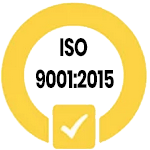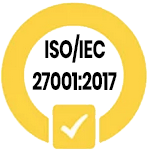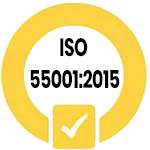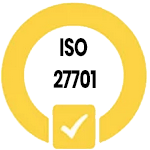PIA TURISMO intends to support investments with the following purposes:
- Raising the quality standards of the offer and the expansion and improvement of ecological and green services that impact the territory in a non-aggressive manner;
- Digitalization of companies operating in the tourism sector to enhance their level of competitiveness and spread and support the evolution of the Tourism Industry 4.0, encouraging the creation of new digital cultural and tourist services and the creation of innovative elements for the tourism ecosystem in Puglia;
- Training of operators in order to promote innovative work organization models to develop the digital and non-digital skills of sector operators through qualified training courses;
- a "new associationism" (partnership) between hotel structures, abandoning the attitude to fragmentation and reasoning instead on operational models that exploit synergies and consider the concentration of actions and "building a system" as a factor of innovation, growth and development , also through the company network;
- the support and qualification of regional employment including female employment.
Location
The eligible initiatives must refer to local units located/to be located in the territory of the Puglia Region. In the case of large companies it will not be possible to relocate in the 5 years following the completion date of the investment, for SMEs in the following 3 years. The companies benefiting from the aid must also undertake to maintain the AWUs counted in the 12 months prior to the submission of the application
demand and present in the territory of the Puglia Region and their increase in the local units subject to facilitation, also with particular attention to female employment. This obligation must be assumed for the full year and the following three years.
What it finances
The Integrated Tourism Facilitation Program must consist of: PRODUCTIVE INVESTMENTS for the creation of:
1. new hotel activities referred to in art. 3 of regional law n. 11/99, through the physical and/or functional recovery of unfinished structures, legitimately begun, intended for hospitality activities; the concessions can be granted limited to works already authorized and, therefore, do not include works for any expansions. This type of investment can also include the creation of "functional services", in compliance with current legislation, closely linked to the hotel structure, which improve the overall quality of the service offered.
2. expansion, modernization and renovation of existing hotel facilities referred to in art. 3 of regional law n. 11/99, for the purpose of raising quality standards and/or classification;
3. construction of hotel facilities referred to in art. 3 of regional law n. 11/99, with accommodation capacity of no less than n. 7 rooms, through extraordinary maintenance and/or consolidation works and the restoration and conservative redevelopment of properties of artistic and historical interest for which, on the date of submission of the access request, the declaration referred to in art. 13 of Legislative Decree no. 42 of 01/22/2004 (Cultural Heritage and Landscape Code);
4. extraordinary maintenance and/or consolidation, restoration and conservative redevelopment of rural buildings, farms, trulli, towers, fortifications for the purpose of
transformation of the property into hotel facilities pursuant to art. 3 of regional law n. 11/99, with accommodation capacity of no less than n. 7 rooms;
5. recovery and redevelopment of abandoned buildings and/or in need of extraordinary maintenance, restoration and conservative redevelopment works or
building renovation;
6. structures, systems or interventions through which the local tourist offer is improved with the aim of encouraging the deseasonalization of tourist flows.
The hotel structures identified in the previous points 2), 3) and 4) can also be created in the form of widespread accommodation.
Investments must mandatorily achieve level 2 of the sustainability certification system for non-residential buildings pursuant to LR 13/2008 (ITACA Puglia Protocol 2017 – Non-residential buildings – annex A to DGR no. 1147 of 11/07/2017, published in BURP no. 89 of 07/25/2017 and subsequent amendments) and obtain the energy performance certificate with at least class B and an energy performance of the building in summer of at least average level.
Each project relating to Productive Investments must integrate digitalisation programs and digital and technological investments, through at least one of the following interventions:

The supported project may also include, exclusively for SMEs:

For Business Networks, PIA Tourism can be represented by a coordinated and integrated project aimed at increasing tourist flows, including international ones, expanding the business of each individual participant in the network, who undertakes to share a renewed, experiential and integrated, also through the figure of a Temporary Manager.
The subject network must be made up of at least 5 network/consortium member companies.
Projects that violate the principle of not causing significant harm (DNSH) cannot be financed.
Eligible interventions - Development Program for Environmental Protection
It must concern an entrepreneurial initiative aimed at protecting the environment, for the implementation of which one or more environmental protection projects are necessary, and, possibly, research, development and innovation projects, strictly connected and functional to each other in relation to the the environmental protection objective of the program.
Facilitation
The Integrated Tourism Facilitation Programs must concern investment programs with a total amount of eligible expenses and costs between 5 million euros and 40 million euros. Productive investment programs must include eligible expenses not exceeding 90% of the integrated project.


Intensity of benefits
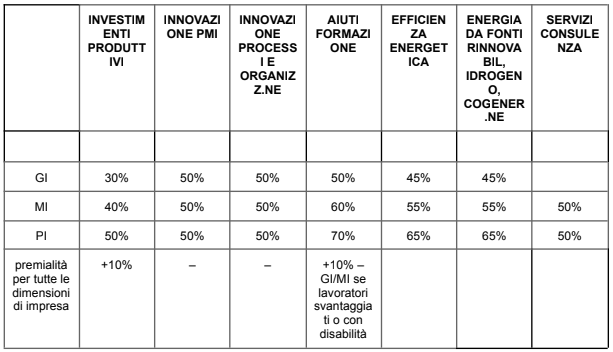
Eligible expenses
investment costs in tangible assets (fixed capital) and intangible assets;
- estimated wage costs of employment created as a result of an initial investment, calculated over two years, or a combination of a part of the costs in tangible and intangible assets, but not exceeding the amount referred to in tangible and intangible assets, whichever is higher. expenses relating to preliminary feasibility studies within the limit of 1.5% of the total amount of eligible expenses;
- purchase of company land and its arrangements within the limit of 10% of the amount of the productive investment; for sites in a state of degradation and for those previously used for industrial use which include buildings, this limit is increased to 15%;
- expenses for planning and works management can be financed up to a limit of 6% of expenses for masonry and similar works;
- purchase of new factory machinery, systems, furnishings and various equipment;
- purchase of patents, licenses, know-how and non-patented technical knowledge, new product technologies and production processes, for the part in which they are used for the activity carried out in the production unit affected by the program.
The beneficiaries of the benefits relating to Productive Investment are obliged to make a financial contribution equal to at least 25% of the eligible costs, either through their own resources or through external financing, in a form devoid of any type of public support and are required to obligation to maintain the subsidized assets in the beneficiary's fixed assets for at least five years for large companies and three years for SMEs from the date of completion of the investment.
Innovation Projects
The services will concern, but are not limited to, the implementation of digital infrastructures, artificial intelligence models for data analysis and user profiling, digital services for advanced tourism innovation, development and implementation of advanced data monitoring systems, customer satisfaction users and specific needs, including particular targets (disabled, elderly, fragile subjects) and/or niche targets; digital services for extended recruitment and matching of professionals in the tourism sector; IT security of transactions and data management; applications of virtual assistants and chatbots, creation of digital tools and multi-channel digital services functional to the "tourist experience"
Eligible expenses on Innovation Programmes
costs of obtaining, validating and defending patents and other intangible assets;
- costs of making 'highly qualified personnel' available by a research and knowledge dissemination organization or a large company carrying out research, development and innovation activities;
- costs for consultancy and innovation support services, including services provided by research and knowledge dissemination organisations, research infrastructures, testing and experimentation infrastructures or innovation hubs.
Process and organizational innovation only for SMEs
Within these programs, only the costs of contractual research, skills and patents acquired or licensed from external sources under normal market conditions are eligible, limited to SMEs.
Training interventions
The recipients of the training can only be entrepreneurs who hold operational roles within the company and workers with fixed-term and permanent employment relationships, registered in the company's single labor register and employed in a local unit located on the regional territory. Apprentices and workers with supply contracts are excluded from eligible interventions.
The eligible training activities must be carried out independently by the proposing company or in collaboration with the bodies included in the Regional List of accredited bodies pursuant to art. 25 LR n. 15/2002.
The proposing company will be able to propose a Training Plan which must involve a minimum number of 5 employees and each training action of which the plan is made up cannot have a number of participants exceeding n. 18 units, without prejudice to the capacity limits for each classroom established by current legislation.
The Training Plan may include the presentation of the following types of plans functional to the training needs relevant to the proposed project:
- typology a) training plans to update professional skills;
- typology b) training plans for the retraining of company workers following changes in duties envisaged by the art. 2103 civil code;
- type c) training plans for updating and/or retraining of company workers following new investments and/or new production facilities and/or production reconversion programmes.
The use of synchronous Distance Learning (FAD) modality is also admissible within the maximum limit of 40% of the number of hours foreseen for each training action; in this case, the proposing company must indicate the platform to be used and acknowledge the adequacy of the technological and content support.
Type of training topics (non-exhaustive)
- open, organizational and technological innovation processes;
- digitalization of processes;
- innovation management;
- internationalization;
- circular economy and environmental sustainability;
- design-driven innovation and eco-design.
No aid is granted for training organized by companies to comply with mandatory national training legislation.
Investments for environmental protection
The programs presented will be able to promote the raising of the level of environmental protection through the implementation of investments aimed at:
- increase the efficiency of systems, plants and devices;
- produce energy from renewable sources.
Eligible investments concern: - energy efficiency measures that are not mere improvements that companies are required to implement to comply with Union standards already adopted, even if not yet in force;
- the promotion of energy from renewable sources.
Investments aimed at promoting the production of energy from renewable sources, solely for self-consumption, are granted exclusively to new plants. With reference to large companies, investments in environmental protection are not currently eligible; the Puglia Region reserves the right to activate its financing in the presence of other resources other than the ESI Funds.
For all interventions relating to environmental protection that involve a quota of electricity production, it must be guaranteed that this occurs exclusively for self-consumption purposes on an annual basis. The request for access requires that the proposed interventions and the related expenses be the subject of a specific report by a qualified technician which contains information about the organic nature of the intervention and its innovative scope.
Counseling programs
Specialist consultancy is eligible exclusively for SMEs and business networks/consortia and is complementary to the services for innovation and technological advancement of companies, also provided through the figure of the Temporary Manager; such consultancy must concern expenses for the purchase of services on specific problems directly relating to the investment project presented, must not be of a continuous or periodic nature and must not be insurable by the professionalism found within the beneficiary. The services must be provided by organized and expert entities in the specific sector of intervention requested for the benefit of and on the basis of written contracts with the entities requesting the contribution. The eligible expenses, but not limited to, concern: real services for the implementation of new organizational models (not present in the company prior to the investment) including the transformation into a Benefit Company and/or B corp, also providing for the figure of the Temporary Manager (who has at least three years of experience in the services provided) excluding the ordinary activity of legal, financial and tax consultancy, services aimed at the reorganization of business processes through the introduction of new management solutions, aimed at increasing productivity and economic performance;
- development and implementation of a digital strategy aimed at accompanying investment choices, enhancing company tools and resources, starting from the determination of specific needs and KPIs, involving users and stakeholders, identifying the most appropriate digital assets for the transition;
- the acquisition of consultancy services to improve the competitive positioning of local production systems regarding e-business and certification in the field of gender equality, product equality, environment, social responsibility and ethics;
- the acquisition of consultancy services for the development of platforms dedicated to the digitalisation of check in / check out processes, online booking processing, experiential and travel design projects, Dynamic Packaging techniques, development of digital projects of thematic itineraries with local partners and for personalization and monitoring of customer satisfaction, actions aimed at spreading conscious and sustainable tourism and to diversify the tourist offer (for example through the use of virtual experiences and the development of digital service ecosystems focused on the offer territorial tourism);
- services also provided by a temporary tourism manager who defines the implementation strategies of innovative interoperable services and who supervises the organization of professional functions in relation to the identified business needs.
Internationalization Programs
Among consultancy expenses, the following specific types of expenses are permitted, but are not limited to:
- development of projects for the competitive growth of companies on foreign markets (e.g. search for foreign partners, scouting for new markets, collective participation in international events/fairs);
- initiatives to improve the approach to the global market (e.g.: digitalisation of business processes, digital marketing, web marketing, acquisition of technologies that favor e-commerce and integrated platforms for trade marketing);
- search for international partners and/or investors;
- preparation of a digital export plan and a development plan on the target markets of the project (mere market studies are excluded) through the use of a Temporary Export Manager (TEM) and/or digital export manager;
- design of digital marketing campaigns or digital showcases in foreign languages, promotion of the site including monitoring and reporting of results;
- consultancy and technical assistance for the start-up and development of B2B and B2C online promotion and marketing (e.g. consultancy and training for the use of international smart payment platforms/systems);
- design of videos, catalogues, directories, brochures, other materials (including digital) written in languages other than Italian;
- support and coaching of the company to allow a wider presence of tourist packages and regional products from Puglia on international e-commerce platforms and market places;
- integration of online marketing channels to increase the visibility of the company brand abroad;
- analysis and research on foreign markets for the preparation of feasibility studies aimed at evaluating the potential of the company with reference to one or more service lines.
Expenses for participation in trade fairs
The following expenditure items are eligible under this program:
- exhibition area rental;
- registration fees, insurance service fees and other mandatory charges foreseen by the event;
- stand setup and design;
- hostess and interpreting.
Presentation
From 30 April 2024.



